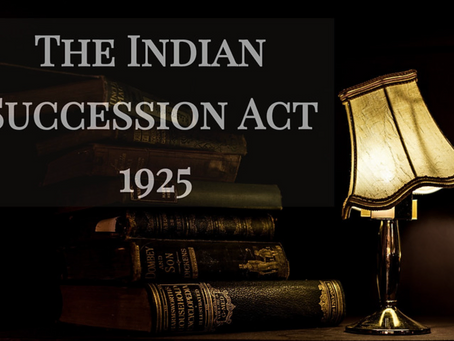A will is made by the testator while alive and comes into effect after his/her demise.
In a simplified manner, A Will is by which a living person (called the testator) declares his desires or intentions. Therefore, there is a degree of respect attached to a Will. It is not like an ordinary sale deed or an agreement, it is something that even a person who executes it cannot come forward to vouch for its authenticity or its correctness.
A Will is never an agreement or contract or settlement. It is for this reason that the beneficiaries of a Will should not be parties to the Will. The declaration must be legal. A declaration that is illegal either by way of the ultimate objective or in some other way will not be considered a Will.
A Will made by a Hindu, Buddhist, Sikh, or Jain is governed by the provisions of the Indian Succession Act, 1925. However, Muslims and Christians are not governed by the Indian Succession Act, of 1925 as they have their laws to execute a will.
Two Types of Will:-
1) Privileged Will
This type of Will is executed by a Soldier/airman employed in an expedition or engaged in actual warfare or someone in the navy. A privileged Will can be in writing or can be oral. It must be written by a testator with his own hands and in such cases, it need not be signed or attested, and still, it is deemed to be a valid Will. It is a special Will made in extraordinary circumstances like war or a dangerous expedition. The only case where this Will is considered invalid is if it is not being completed by the testator or he dies before completing it.
2) Unprivileged Will
It must be in writing, signed by the testator in the presence of witnesses, signed by two or more witnesses in presence of the testator.
Any property whether movable or immovable or a property that is still not acquired can be made part of a Will.
A law does not prescribe any particular format for a Will. A person can take any plain paper and write the Will in his / her hand putting down his / her wishes on paper without any need for assistance from a legal professional. Such a Will in one’s handwriting is called Holograph Will. If a Holograph Will is duly attested by witnesses, there is a strong presumption in favor of the genuineness of the Will.
Execution of a Will:-
The process by which a testator’s Will is made legally valid is known as Execution of Will. A Will is a legal document, signed in compliance with the various formalities covered by the legislation. It is the expression of the testator’s wishes concerning how his/her property is to be distributed. It is the only way one can ensure his/her assets will be distributed according to his/her wishes after his/her death. It should be in writing, however, it may be either handwritten, printed, or typed. The testator must sign at the end of the Will. It must be witnessed by at least two persons present at the time of signing by the testator.
Essential Requirements for Making of a Will :
• A person, being major, and of sound mind can execute a Will.
• He/she can dispose of all his/her property or any part of the property under a Will.
• The Will must be a last Wil and testament.
• A declaration should be given by the testator that he/she revokes all earlier Wills if any.
• However, in case of a subsequent Will, is inconsistent and void with an earlier Will, the earlier Will can be considered by implication as if it is revoked.
• A Will should be made by the testator who has a sound mind in the state.
How to Prove a Will:-
Under Section 68 of the Indian Succession Act, 1925, If a document is required by law to be attested, it shall not be used as evidence until one attesting witness at least has been called to prove its execution, if there be an attesting witness alive, and subject to the process of the Court and capable of giving evidence.
A Will can be given to any person even as a gift. It means a transfer of asset/property by a donor out of his own free will to a donee without any consideration. It is not important that a person to whom the property/ asset is transferred by a family member only, it can be any person or entity, whether family, friend, related, or otherwise; it needs to be attested by two witnesses.
The donor and the donee need to be alive and capable of giving and accepting the gift at the time it is given, as documented through their execution of a gift deed.
Niharika Mittal
Advocate
